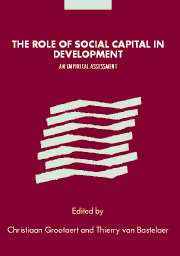Book contents
- Frontmatter
- Contents
- List of figures and maps
- List of tables
- List of boxes
- Notes on contributors
- Acknowledgments
- Foreword by Robert D. Putnam
- Introduction and overview
- Part 1 Social capital at the micro and macro levels: a conceptual discussion and review
- Part 2 The impact of social capital on development
- Part 3 The creation and transformation of social capital
- Conclusion: measuring impact and drawing policy implications
- Index
- References
Introduction and overview
Published online by Cambridge University Press: 22 September 2009
- Frontmatter
- Contents
- List of figures and maps
- List of tables
- List of boxes
- Notes on contributors
- Acknowledgments
- Foreword by Robert D. Putnam
- Introduction and overview
- Part 1 Social capital at the micro and macro levels: a conceptual discussion and review
- Part 2 The impact of social capital on development
- Part 3 The creation and transformation of social capital
- Conclusion: measuring impact and drawing policy implications
- Index
- References
Summary
As economics and other social sciences improved their analytical apparatus throughout the twentieth century, it became increasingly clear that, despite major technical refinements, their tools were not able to account entirely for observed variations in cross-country levels of economic development. Indeed, these tools – in particular as used in neoclassical growth theory – were not fully successful at explaining why countries with similar endowments of natural and physical capital experienced vastly different rates of growth and levels of per capita income. At the same time, development practitioners in the field were observing variations in project performance that could not be fully explained by differences in the quality and quantity of the inputs. Equally surprising was the observation that apparently similar communities exhibited very different track records in managing common resources or organizing for the common good.
By the mid-1960s researchers and practitioners had come to recognize that the quality of the labor factor of production was as critical as its quantity in assessing the impact of human input on growth and development (see Becker 1962, Schultz 1963). Although the subsequent search for a scientifically satisfying definition and measure of “human capital” was only partly successful, the concept has since been largely accepted by the academic, practitioner, and policymaking communities.
The addition of this new construct to the social scientists' toolkit only partly filled the conceptual and empirical gap in the understanding of the sources of growth and differences in project success.
Information
- Type
- Chapter
- Information
- The Role of Social Capital in DevelopmentAn Empirical Assessment, pp. 1 - 16Publisher: Cambridge University PressPrint publication year: 2002
References
Accessibility standard: Unknown
Why this information is here
This section outlines the accessibility features of this content - including support for screen readers, full keyboard navigation and high-contrast display options. This may not be relevant for you.Accessibility Information
- 22
- Cited by
